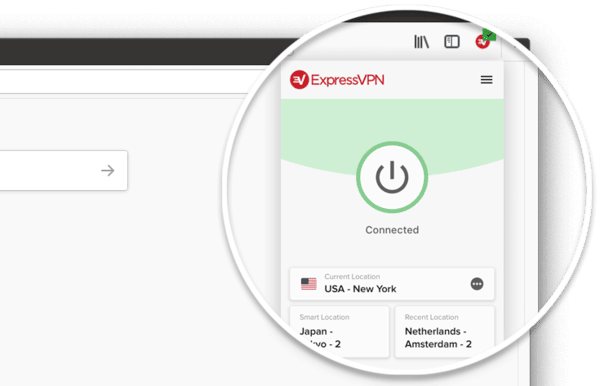The internet isn’t private; anyone can track your identity and location through your IP address. In fact, even using the incognito mode or clearing your browsing history does not make you completely anonymous online.
Fortunately, numerous browser extensions can help you improve your privacy. For example, ad blockers will block annoying ads, password managers will secure your passwords, and VPN extensions will keep you safe and private online. Our article lists the best extensions for privacy. Let’s discuss them in detail.
Quick list of best browser extensions for online security and privacy
Here is a summary of the top privacy browser extensions if you are short on time to review the entire article.
- VPN browser extension – A robust VPN extension like ExpressVPN or NordVPN lets you achieve online privacy even when visiting poorly-secured websites.
- AdBlock Plus – The best ad-blocking extension that works well with popular and minor browsers.
- AdGuard – Customizable ad-blocking browser extension with a massive filter list to eliminate all trackers.
- uBlock Origin – Lightweight browser extension that will start blocking invasive ads immediately after installing it.
- Ghostery – This browser extension will identify and block active tracking cookies to prevent them from collecting your information.
- Click&Clean – The browser extension will automatically clear your browsing history and cookies to maintain your online privacy.
- Privacy Badger – This AI-based browser add-on will monitor and block cookies tracking your activities.
- HTTPS Everywhere – Ensure that the websites you visit use HTTPS to keep you safe online.
- Cookie AutoDelete – Automatically deletes trackers in your browser and even has a whitelist feature for cookies you don’t want to delete.
- DuckDuckGo Privacy Essentials – Automatically blocks malicious trackers and ensures websites use HTTPS.
- Keeper – The best password manager to protect your login credentials.
- LastPass – Helps keep your passwords in a central location and utilizes AES 256-bit encryption for maximum protection.
- Dashlane – A reliable password manager that uses robust encryption to secure your passwords.
- RememBear – Has a user-friendly interface and allows you to use it simultaneously on multiple devices.
What is a browser extension?
A browser extension is an application that adds functionality and capacity to your browser. Also known as a plug-in, an extension can utilize the web interface (APIs) as JavaScript on a web page. But it also has its own JavaScript APIs.
Usually, web browsers have few privacy functions. Although browsers are becoming more advanced, they cannot keep up with dedicated apps like ad blockers, virtual private networks (VPNs), and password managers. However, you can increase your online privacy and security by installing third-party browser add-ons.
VPN extensions for browser privacy
Online anonymity is a trait that you only acquire via a VPN. However, ideally, you should use VPN apps to protect your device’s internet traffic. However, in many cases, that is impossible, or you don’t need such security. In that case, VPN browser extensions are an ideal workaround to protect your browsing privacy.
1. Compatible browser add-ons from your VPN provider

Thankfully, almost all leading VPNs of today offer dedicated browsing extensions that even work without installing the VPN client. All you need to do is subscribe to the VPN service. Then, installing the compatible browser extension on your device and signing in to your account will let you protect your browser’s traffic.
The VPN will route your browser’s traffic through an encrypted tunnel and also change your IP address. This lets you access any website on the internet anonymously.
If you’re curious about such VPNs, check out this detailed list of the best VPNs with browser extensions. You’ll indeed find your best pick here. If you want a quick recommendation, we’d suggest going with ExpressVPN.
Ad blockers for preventing unwanted ads and script
Online ads can be very frustrating when browsing the internet or even streaming. Installing a reliable ad-blocking extension is one of the easiest ways to improve your experience. It will block ads and other malicious scripts on the web pages you visit.
Most ads are harmless, but some contain malware or direct you to sites filled with malware. Also, others have offensive content or NSFW imagery that can be embarrassing in public. Here are some of the best ad-blocking browser extensions.
2. AdBlock Plus
It is perhaps the most popular ad blocker extension today. It is available for free and compatible with all major browsers, including Chrome, Firefox, Opera, Edge, and Safari. In addition, the extension works well with other minor browsers such as Maxthon, Yandex, and Chromium.
AdBlock Plus has a default list that will block most ads immediately after installing it. Also, you can create your own list or even import it from other sources. There is even an option to block ads on specific web pages.
On the downside, it has an initiative known as ‘acceptable ads.’ Since it is a free service, it makes money by allowing paying companies to show ads. So, sometimes, you will get pop-ups even when the extension is active. That defeats the purpose of using the ad blocker in the first place.
3. AdGuard
AdGuard is a customizable ad-block browser extension that blocks ads, cookies, etc. In addition, its Tracking Protection feature has an enormous filter list and removes all trackers.
The extension is free, but there is an option to upgrade to the paid offering for additional functionality. Besides the browser extension, AdGuard also offers a standalone desktop version for Windows, macOS, iOS, and Android.
One of its prominent features is the stealth mode. It will help block other online options besides adverts and trackers that may compromise your security. For example, you can conceal your search queries, block WebRTC, hide referrer details, etc.
4. uBlock Origin
uBlock Origin is a lightweight extension that uses fewer system resources. It works well with major browsers, including Firefox, Open, and Google Chrome. You can download it for free.
Once you install, the extension will promptly filter out intrusive ads and malicious scripts once you install it. In addition, since the provider sends updates constantly, almost all ads will be blocked.
Besides the default blocking list, the extension also has a feature for blocking page elements. You can use it by right-clicking on a field or image and tapping on ‘Block Element.’ A text box will appear with the URL of the element, so click ‘Create‘ to add it to the blocking list.
Whitelist your favorite websites
Remember that blocking ads on the sites you visit affects their revenue. Ad-blocking extensions like AdBlock Plus and uBlock Origin help to improve your online privacy and experience, but they negatively impact websites.
Most websites are free because the owners sell ad space to generate revenue. Blocking the ads prevents the websites from making an income. Using an adblocker will definitely effect their income. However, you can whitelist such kinds of sites and get the content you need.
Maintaining and sustaining a website is very costly. That is why some websites like Netflix require you to pay a subscription to access their content. Hence, you are unlikely to get ads on such sites.
Both AdBlock Plus and uBlock Origin have an option to whitelist websites. That means you will continue to see the ads to help sustain the website. However, you should only whitelist websites you trust that don’t show intrusive ads.
Some websites deny you access if you have an active ad blocker. If you try to open such a site, you get a message telling you first to deactivate the ad blocker to access it.
Browser extensions to surf safely and anonymously
When you surf the web, you leave traces of your information everywhere. Undoubtedly, many trackers and cookies try to trace your browsing behavior. Luckily, you can install a browser extension to protect your privacy online. Here are some of the reliable options.
5. Ghostery
Ghostery is a great browser extension to control trackers on the internet. It identifies active website tracking cookies and allows you to block them. Hence, it prevents websites from collecting your information, which is an excellent way to increase your safety and privacy.
Fortunately, the extension is free and available for various browsers, including Opera, Chrome, Firefox, Safari, Brave, Edge, and Cliqz. It also has a mobile version for Android and iOS devices.
Note: Ghostery’s privacy policy is worrying because of a program known as GhostRank data collection. It collects your information to improve the quality of the service. However, you don’t have to be concerned with your privacy if you don’t opt-in.
6. Click&Clean
Clearing your browsing history and cookies is pretty straightforward on most browsers, but Click&Clean makes it easy. In fact, it will also remove temporary files and flash cookies.
Furthermore, it allows you to run a privacy check, view and remove pages in the cache, and scan for malware.
7. Privacy Badger

Privacy Badger is an AI-based browser extension that learns to prevent invisible trackers gradually. Unlike other options in this list, the extension won’t start to block cookies immediately. Instead, it will monitor trackers on the sites you visit and use the information to learn.
After some time, it will identify and block the cookies tracking your activities. As a result, less intrusive and useful cookies will not be affected.
The extension utilizes a unique learning system, so it will work better and more effectively the more you use it. Currently, Privacy Badger is compatible with Chrome, Opera, Firefox, and Android.
8. HTTPS Everywhere
Most websites use the HTTP or HTTPS protocol, and their URLs start with either HTTP:/ or HTTPS:/. The ‘s’ shows that your connection to the sites is encrypted, ensuring your online privacy and safety. Additionally, third parties cannot alter the information you exchange with the websites you visit. Hence, you will unlikely end up on a fake website.
The HTTPS Everywhere extension ensures that websites work with HTTPS to improve your online security. It is available for Chrome, Firefox, Brave, Android, and Opera.
9. Cookie AutoDelete
Cookie AutoDelete will automatically wipe cookies in your browser after every session. Deleting cookies regularly is essential to prevent websites from tracking your online behavior. However, this extension will do all the work for you, so you don’t have to remember to clear your cache.
Thankfully, Cookie AutoDelete has a whitelist option that allows you to add cookies you trust and don’t want to delete. This feature can come in handy sometimes. For example, you can add your Netflix cookies to avoid logging in whenever you open a new tab. The extension works well with Firefox and Chrome.
10. DuckDuckGo Privacy Essentials
DuckDuckGo is on a mission to improve online privacy by offering alternative solutions. For example, it has a privacy-conscious search engine that you can use instead of Google.
Privacy Essentials is its newest offering that helps to protect your privacy by:
- Automatically blocking malicious trackers
- Ensuring that websites use HTTPS, meaning it has an SSL certificate installed
- Gauging the reliability and trustworthiness of websites
The extension is free and available for Chrome, Firefox, Opera, Chrome, iOS, and Android.
Password manager browser extensions
You probably have multiple online accounts like social media, banking, emails, etc. Ideally, using a different and unique password for each account is advisable. You can also use our free password generator to create solid, easy-to-remember passwords.
However, memorizing all the passwords can be difficult, so you should use a password manager. It will encrypt and store your passwords under one roof. Here are some of the best password manager browser extensions.
11. NordPass
NordPass is a great password manager, and its extension is available for Firefox, Chrome, Safari, Opera Edge, etc. Fortunately, it uses robust encryption to protect your passwords.
Despite the premium service, its free version is appreciateable. For example, it doesn’t have a limit on password storage; you can store as many passwords as you want on a single device. However, premium plans come with several advanced features, including a Data Breach Scanner, File Attachments, Password Health, Emergency Access, Secure Item Sharing, and Email Masking.
Moreover, NordPass stores your master password and encryption keys locally on your device. Hence, the provider won’t access them.
12. Proton Pass
Proton Pass is a popular freemium password manager from Proton, its parent company. Its interface is user-friendly and highly thematized. You can install its extension on any browser you, as the password manager is compatible with almost every browser.
Thankfully, it employs robust AES 256-bit encryption and has been independently audited. Also, you can use it on multiple devices simultaneously, and it automatically synchronizes information on all devices.
Besides protecting your passwords and login credentials, you can use Proton Pass to store your sensitive notes.
13. LastPass
LastPass is another good option to secure your passwords in one central location, so you don’t need to memorize them. It uses virtually unbreakable 256-bit AES encryption to keep your passwords safe. Also, it saves your encryption keys and master password on your device for more privacy.
The extension is compatible with major browsers, so you can use it on your smartphone, laptop, and desktop. Also, the changes you make to your account are synchronized across all devices.
LastPass offers a free version, but it has few features. However, you can upgrade to the premium tiers to access features like encrypted file storage, multi-factor authentication, priority tech support, etc.
14. Keeper
Keeper is a trustworthy password manager available. Besides securing your passwords, it will enable you to keep track of your payment cards, phone numbers, payment cards, etc. Fortunately, it arranges everything neatly into distinct folders.
Moreover, when you first log in or create a new password, it will automatically add them to the vault. Also, you can import passwords from Firefox, Chrome, Edge, and Opera.
Keeper offers excellent security features to protect your accounts. For example, it has a self-destruct setting that automatically deletes your data after five unsuccessful login attempts.
Privacy extensions vs. a secure browser
A browser extension will come in handy to prevent websites from collecting your information with trackers. However, a secure browser will protect you better than privacy add-ons.
A private browser like the Tor Browser is designed to keep you anonymous online. That includes blocking trackers, protecting your browsing history and data, blocking pop-ups and ads, etc.
Therefore, a secure browser is the best way to stay anonymous online without worrying about trackers. In addition, you can pair with other apps like the ExpressVPN standalone app or DuckDuckGo private search engine.
FAQs
Yes. Browsers like Chrome have a lot of features, and adding more extensions can slow it down. So, install only the necessary add-ons to improve your internet experience.
Yes, it is effortless to remove extensions from your browser. For example, on Google Chrome, go to your extensions list. Then, click the ‘Enable/disable toggle’ or tap on ‘Remove’ to uninstall the extension.
Most Chrome extensions update automatically, but you can also do it manually. Navigate to your extensions list, open the add-on you want to update, click on ‘Details,’ and tap ‘Update.’
ExpressVPN undoubtedly has the best browser extension. It is straightforward to install and will protect your connections and block malicious trackers that can compromise your online privacy.

